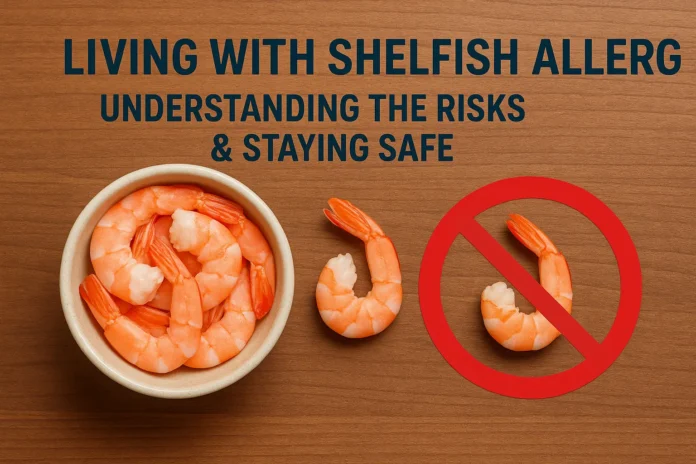For many, the thought of a glistening platter of shrimp, succulent crab legs, or briny oysters conjures images of culinary bliss. The ocean’s bounty offers a delectable array of flavors and textures. But for a significant portion of the population, these very delights represent a hidden danger: shellfish allergies.
Far from being a mere inconvenience, shellfish allergies can range from mildly uncomfortable to life-threatening, making every meal a potential minefield. And unlike some other food allergies, shellfish allergies often develop in adulthood and tend to be lifelong, presenting a unique set of challenges for those affected.
Checkout Peanut Allergy: Understanding, Managing, and Living Safely
More Than Just a “Fishy” Problem: Understanding the Nuances
It’s crucial to understand that “shellfish” isn’t a single entity when it comes to allergies. It’s broadly categorized into two main groups:
- Crustaceans: This group includes familiar culprits like shrimp, crab, lobster, and crayfish. The primary allergen in crustaceans is a muscle protein called tropomyosin.
- Mollusks: This category encompasses clams, mussels, oysters, scallops, octopus, and squid. While tropomyosin can also be an allergen in mollusks, other proteins can trigger reactions as well, leading to less predictable cross-reactivity compared to crustaceans.
This distinction is important because some individuals may be allergic to only one group, while others react to both. However, due to the high risk of cross-reactivity, especially within crustaceans, medical professionals generally advise avoiding all shellfish if you’ve been diagnosed with an allergy to one type.
The Allergic Reaction: A Spectrum of Symptoms
The symptoms of a shellfish allergy can manifest rapidly, typically within minutes to an hour of ingestion, and can vary widely in severity:
- Mild Symptoms: Hives, skin rash, itching, tingling in the mouth, nasal congestion, sneezing, and mild abdominal pain.
- Moderate Symptoms: Vomiting, diarrhea, swelling of the lips, face, and throat (angioedema), wheezing, and shortness of breath.
- Severe Symptoms (Anaphylaxis): A life-threatening reaction that can include a sudden drop in blood pressure, dizziness, fainting, severe difficulty breathing, rapid pulse, and loss of consciousness. Anaphylaxis is a medical emergency and requires immediate injection of epinephrine (e.g., EpiPen) and emergency medical attention.
Navigating the World with a Shellfish Allergy: Practical Tips
Living with a shellfish allergy requires vigilance and proactive management. Here are some essential tips:
- Get a Proper Diagnosis: If you suspect a shellfish allergy, consult an allergist. They can perform skin prick tests or blood tests to confirm the diagnosis and identify specific allergens.
- Strict Avoidance is Key: This means carefully reading food labels, asking questions at restaurants, and being wary of cross-contamination.
- Be Aware of Hidden Shellfish: Shellfish derivatives can lurk in unexpected places, including some Asian sauces (e.g., fish sauce often contains anchovies), surimi (imitation crabmeat), and even some dietary supplements.
- Inform Others: Make sure family, friends, school staff, and colleagues are aware of your allergy and what to do in case of a reaction.
- Always Carry Your Epinephrine Auto-Injector: If you have a severe allergy, never leave home without your prescribed epinephrine auto-injector and know how to use it.
- Educate Yourself and Others: The more you understand about your allergy, the better equipped you’ll be to manage it. Share reliable information with those around you to foster a supportive environment.
- Consider an Allergy Bracelet/Necklace: In case of an emergency, medical identification jewelry can quickly inform first responders of your allergy.
- Cook at Home More Often: Preparing your own meals gives you complete control over ingredients and reduces the risk of accidental exposure.
Checkout Is Cetirizine Safe to Consume? A Comprehensive Guide to This Popular Antihistamine
Beyond the Plate: The Emotional Impact
Living with a severe food allergy can be emotionally taxing. There’s the constant anxiety of accidental exposure, the feeling of being “different,” and the social challenges of navigating meals out with friends and family. It’s important to acknowledge these feelings and seek support if needed, whether from support groups, therapists, or understanding loved ones.
The Future of Shellfish Allergy Management
Research continues to advance our understanding of food allergies. While a cure for shellfish allergies isn’t currently available, ongoing studies are exploring potential therapies like oral immunotherapy (OIT) and new medications that could offer hope for desensitization or better management of reactions.
In the meantime, empowering yourself with knowledge, practicing strict avoidance, and being prepared for emergencies are your best defenses against the ocean’s double-edged sword. With careful planning and awareness, individuals with shellfish allergies can still lead full, vibrant lives, enjoying a world of delicious foods, just perhaps not the ones that once swam in the sea.
Disclaimer: This blog post is for informational purposes only and does not constitute medical advice. If you suspect you have a shellfish allergy, please consult with a qualified healthcare professional for diagnosis and treatment.


